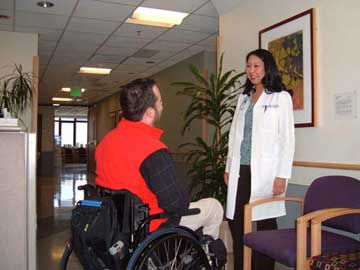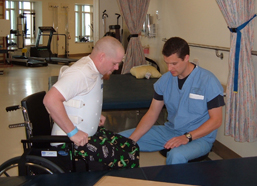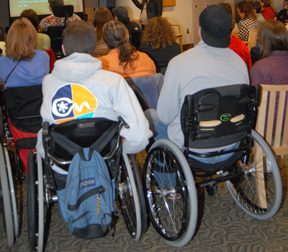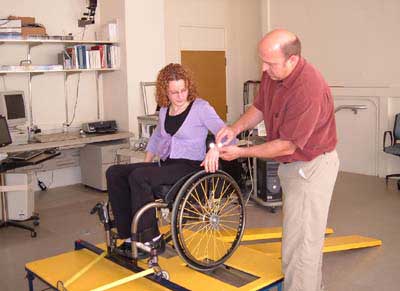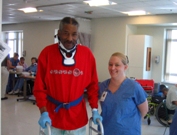Spring 2002: Volume 11, Number 1
Rover in Rehab: Therapy dogs work with SCI patients at University of Washington and Harborview Medical Centers
Animal lovers know how comforting a pet can be. Health care providers now recognize that the unconditional love and companionship of a pet can have beneficial effects on the physical and psychological health of the people around them. Increasingly, therapy animals are being used in nursing homes, hospitals, and other therapeutic settings to encourage social interaction and reduce loneliness. At Harborview and the University of Washington Medical Center, therapy dogs have become regular members of the rehabilitation staff.
Twice a month, UWMC Occupational Therapist Barbara Esser brings her 10-year-old golden retriever Rusty to work with her. The hospital photo ID hanging from his collar attests to his official capacity: Rusty Esser, Therapy. Another tag shows that he has been certified by Therapy Dogs, Inc., as having the socially appropriate behavior considered necessary for therapy settings.
Rusty's friendly and affectionate manner has a positive effect on patients and staff alike. Faces light up when he enters a room, and patients and family members immediately start talking to him. "When patients are with him, they talk more, increase their interaction, smile more. They really look forward to seeing him," Esser said. "Staff come from all over the hospital to visit him. He loves everyone."
As part of UWMC's Animal Assisted Rehabilitation Therapy Program, Rusty is used to enhance the treatment of patients' physical, cognitive, perceptual, mental and emotional impairments. Petting Rusty or taking his collar off may be incorporated into a patient's upper extremity therapy program. Speech therapy may include giving the dog commands. Unlike service dogs, therapy dogs like Rusty are not trained to do assistance tasks. "He just provides love," said Esser.
Harborview Occupational Therapist Cheryl Grant has been a Canine Companions for Independence (CCI) puppy-trainer for a series of CCI pups, who are groomed to eventually become assistance dogs for people with disabilities. When a dog is under her care, it works alongside her as a Harborview therapy dog.
Like Rusty, Grant's dogs are incorporated into a patient's rehabilitation therapy whenever possible. "Having patients brush the dog takes their minds off the exercise while giving them a functional activity," Grant said. "They pay attention to the dog , and it distracts them from the pain."
Dogs also help with emotional and social adjustment. A teenager who was afraid to leave the hospital for the first time after his injury finally agreed to go to a baseball game as long as he could bring the CCI pup with him. It was a great success. "The dog makes you approachable," Grant said. "It opens up your social life and connection with the public."
Resources
Therapy Dogs, Inc., helps dog owners use their dogs for therapy work in various settings (PO Box 5868, Cheyenne, WY 82003; 877-843-7364; therapydogs.com ).
Delta Society provides information about improving human health through service and therapy animals (289 Perimeter Road East, Renton, WA 98055; 425-226-7357; www.deltasociety.org ).
Canine Companions for Independence (2965 Dutton Ave, PO Box 446, Santa Rosa, CA 95402; 707-577-1700; www.caninecompanions.org ) and Summit Assistance Dogs (5458 W Shore Rd, Anacortes, WA 98221; 360-293-5609; http://www.summitdogs.org/) provide trained assistance dogs for persons with

